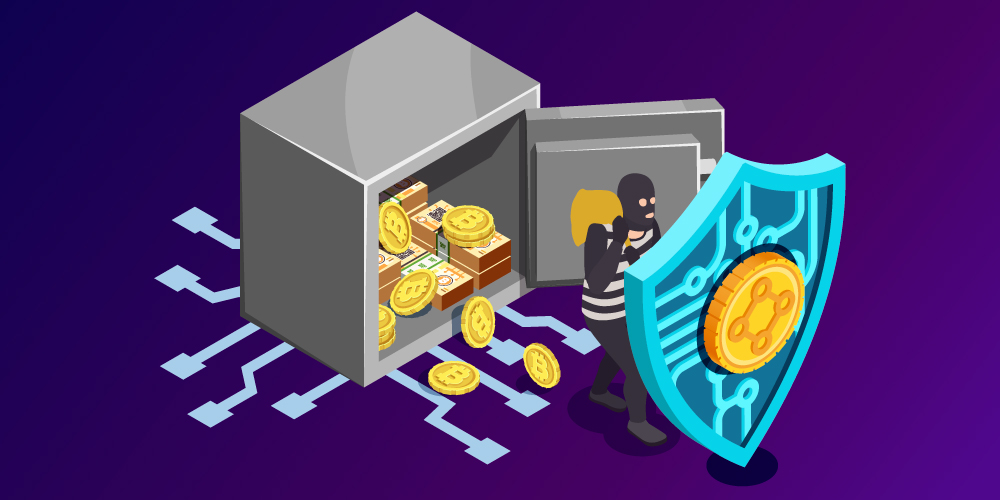Bitcoin is considered one of the best innovations of our time. Today, cryptocurrency is a real alternative to fiat currencies, but the real innovation that should change the world is not Bitcoin, but the accompanying technology – the blockchain network.
Advantages of Blockchain
Although there are some scientists who have discovered the early development of blockchain technology, it was first launched to ensure the existence of Bitcoin. In essence, the blockchain network is a decentralized database in which data about records is stored in a mutually distributed digital registry. Thanks to this technology, network users can confirm transactions without the help of a central institution.
In fact, the main advantage of the technology is its independence from any banking institutions. In addition, as records are added and processed by participants online or shared, there is complete transparency about the information shared in the database.
In addition, transaction fees on the network are low and are rewarded by miners who process blocks of transactions. Other advantages are that users are anonymous on the network, transactions are irreversible, and the blockchain network is protected from unauthorized access. So, this is a reliable system that can be used as a solution for many other problems that go beyond the cryptocurrency world, such as secure fund transfers, supply chain management, voting, and many others.
Blockchain technology and other cryptocurrencies

Blockchain technology is also used for other cryptocurrencies that were launched after Bitcoin. One of the digital currencies that has recently attracted a lot of attention is the digital yuan.
It is the first virtual currency created by the government, particularly the central bank of China. The e-yuan is expected to quickly reach the high price of $ 5,000, and there is a huge interest in investing in this particular asset.
After the release of Bitcoin, more than 8,000 other cryptocurrencies are now available on the market, and they rely on blockchain technology to work.
Blockchain Technology in the Public Sector
Blockchain technology can be used to increase transparency in the public sector, optimize processes, fight corruption, and reduce the number of errors in the database. It has already been applied to increase election transparency with the UN’s Followmyvote app.
For example, the United Arab Emirates is working on a project to improve central bank operations using Blockchain technology. Another advantage of implementing blockchain technology is that the network is very secure and therefore well equipped to protect citizens ‘ confidential data. Another example is the state of Delaware, where there is a pilot program based on a blockchain solution for a corporate registry system.
Blockchain Technology in the Business Sector
The technology is also very attractive for businesses, especially since it provides end-to-end product tracking. Consequently, traceability in the supply chain is improved, as well as security is increased again and fraud is reduced. In addition, it can also be used to solve problems with customers and employees.
One example is the company FedEx, which is trying to apply blockchain technology to reduce the number of customer complaints and effectively solve their problems. In conclusion, blockchain technology has huge potential, and we have yet to see how it will change various sectors of our society.
There is no denying that blockchain does provide unprecedented data security for its users. It combines the traditional notion of accountability with cutting-edge technologies that allow businesses and individual users to seamlessly protect their important digital information.
How Blockchain Can Improve Your Business ‘ Cybersecurity

When it comes to improving cybersecurity, entrepreneurs or small business owners can benefit from blockchain technology. Interestingly, they can use this impressive approach in different ways to eliminate different security loopholes available in their corporate networks, depending on the situation. These different ways include:
- Protect critical and sensitive data
- Knowledge of your client
- Real-time detection and prevention of cyber attacks
- Smart contracts
- Eliminating passwords in systems using blockchain
- Protecting critical and sensitive data
With blockchain, employers can easily protect their important business data from the prying eyes of hackers, scammers, and other cyber thugs.
The blockchain technology encrypts your official data, and as a result, hackers and other unwanted people cannot change such data. In addition, entrepreneurs or small business owners can store the cryptographic signature of a specific business file or document in the block chain. This signature will indicate to users that the file or document is undamaged and safe to use.
Entrepreneurs can also rely on various cybersecurity tools, such as business VPNs, to secure their critical assets, including business data, to a new level.
For example, they can use NordVPN to find out how it can protect their sensitive official data online. By taking advantage of the free trial of NordVPN, they will be able to easily explore numerous security and privacy features in one place. If they believe that NordVPN is the right choice to protect their data and fight diligently against various cyber risks, they can get its premium packages depending on their requirements.
- Know about your customers
The best thing about using blockchain technology is that you can study your loyal customers in detail. By doing so, you can increase your customer base according to your preferences.
As you may know, blockchain provides employers with more reliable identity management solutions. This way, you can store information about your employees and customers on the blockchain network. You can also assign digital IDs to your employees and customers to help you verify their identity as needed.
As a result, you can overcome various cybersecurity challenges, such as identity theft, money laundering, and more.
- Real-time detection and prevention of cyber attacks
Small businesses can benefit from blockchain principles and detect possible cyberattacks in a timely manner. For example, Guardtime is using the blockchain concept to develop a new mechanism known as a keyless signature infrastructure.
Interestingly, this updated version of the classic keyless signature infrastructure allows employers to get rid of the need for a centralized certificate authority (CCA). Therefore, they will be able to better detect and stop cyber attacks in real time.
- Smart contracts
Smart contracts are another way to properly enhance the cybersecurity of various businesses. These are pre-recorded conditions that must be met during transactions. With smart contracts, cybersecurity professionals can independently verify such transactions without risk.
- Eliminating passwords in systems using blockchain
Passwords are one of the oldest cybersecurity techniques for protecting your corporate information online. However, over time, this method has become obsolete, as it is easily hacked by hackers and other cyberterrorists.
In this situation, the role of the blockchain will come in handy again. Fortunately, small business owners or entrepreneurs can use the principles of blockchain to completely eliminate the need to use passwords on their networks.
How Blockchain Prevents Identity Theft

When it comes to security, blockchain is a leader in terms of its ability to protect its data, take power and risk from central locations, and mitigate potential attacks. Thanks to P2P, data transmission is reliably verified, and hashes ensure that the data is not changed. This is used every time you send money through bitcoin wallets to transfer money.
Bitcoin, for example, has been testing this model for years with its secure, decentralized transfer methods. It is clear that blockchain can lay the foundation for a new era of secure trading, but where else can it go? Identity theft is an area where centralized branches can be hit hard. If one location is compromised, millions of records, including customer data, will be compromised.
According to the Washington Post, in 2014, Sony was hacked, and information about employees was posted online, which led to all sorts of damage. Personal conversations, salaries, and executive information were published. This is a clear theft of information. Another incident involving the hacking of the company and personal data occurred in 2019. According to CMBC, Capital One was hacked and 100 million records were stolen. Over the past decade, many companies have been hacked because they store huge amounts of data; hundreds of millions of records have been stolen. The list will go on and on unless these company databases are decentralized.
Identity theft is easiest through centralized repositories that store a lot of data. If the data is decentralized through the blockchain, access to large amounts of data disappears. The blockchain acts as a data transfer network for Bitcoin, so it should work effectively as a secure data hub. When accessing the data, transfers will be made, and forced access will be denied by P2P. The whole system will have to agree on storage and retrieval. Using a sophisticated system to access information can effectively prevent unauthorized access to data. It is unlikely that all cyber attacks will ever stop, so the best thing to do is mitigate them.
Corporate and government systems store a lot of personal information, and by allocating potential targets, the likelihood of anyone being hit is reduced. Even if a part of the system is hit, most of the data will not be compromised if the blockchain is used. If the order of blocks for transfers is determined by a proxy, the hacked hash order will not match the original order in which the blocks were created. The hashes don’t match.
This is another potential level that blockchain can enter with identity protection. As the blockchain is so simple and flexible, it is able to protect any system. Blockchain is like cutting down a forest to prevent wildfires. Since the trees are not densely located in the center of the city, the fire can not easily spread. When it comes to identity theft, the problem is mitigated when someone is injured and only a small fire is lit. Since thieves can’t be in the same place as us, using a proxy as an identifier in the blockchain adds an extra layer of security.
P2P transmission allows you to certify a location without knowing exactly where the computer is, which is critical to solving this problem. The location check is the order of the blocks in your immediate vicinity (including you).
Identity theft is a global problem that affects approximately 15 million people a year. If the centralized information stores are dismantled, there will be less information that can be stolen. Because names are trustworthy, you can strive for them.
Blockchain is a global giant in the world of commerce, but information is also a kind of commerce. Centralized information is dangerous because it acts as an object of theft. Blockchain solved this problem with P2p. Another reason why identity theft can be solved with the help of a blockchain is the ability to use blocks linked through a proxy. This potential makes identity theft impossible.
Blockchain is an effective method of secure transmission and storage of information, which reduces the amount of data that can be attacked. In the future, the blockchain may become a new system for the modern world of information storage and transmission.
At the moment, the cloud is a large data center owned by Google or Amazon, but ultimately it could be people’s data protecting each other with a blockchain. Data is the most valuable thing in the modern world, and it is very important to figure out how to protect it.


